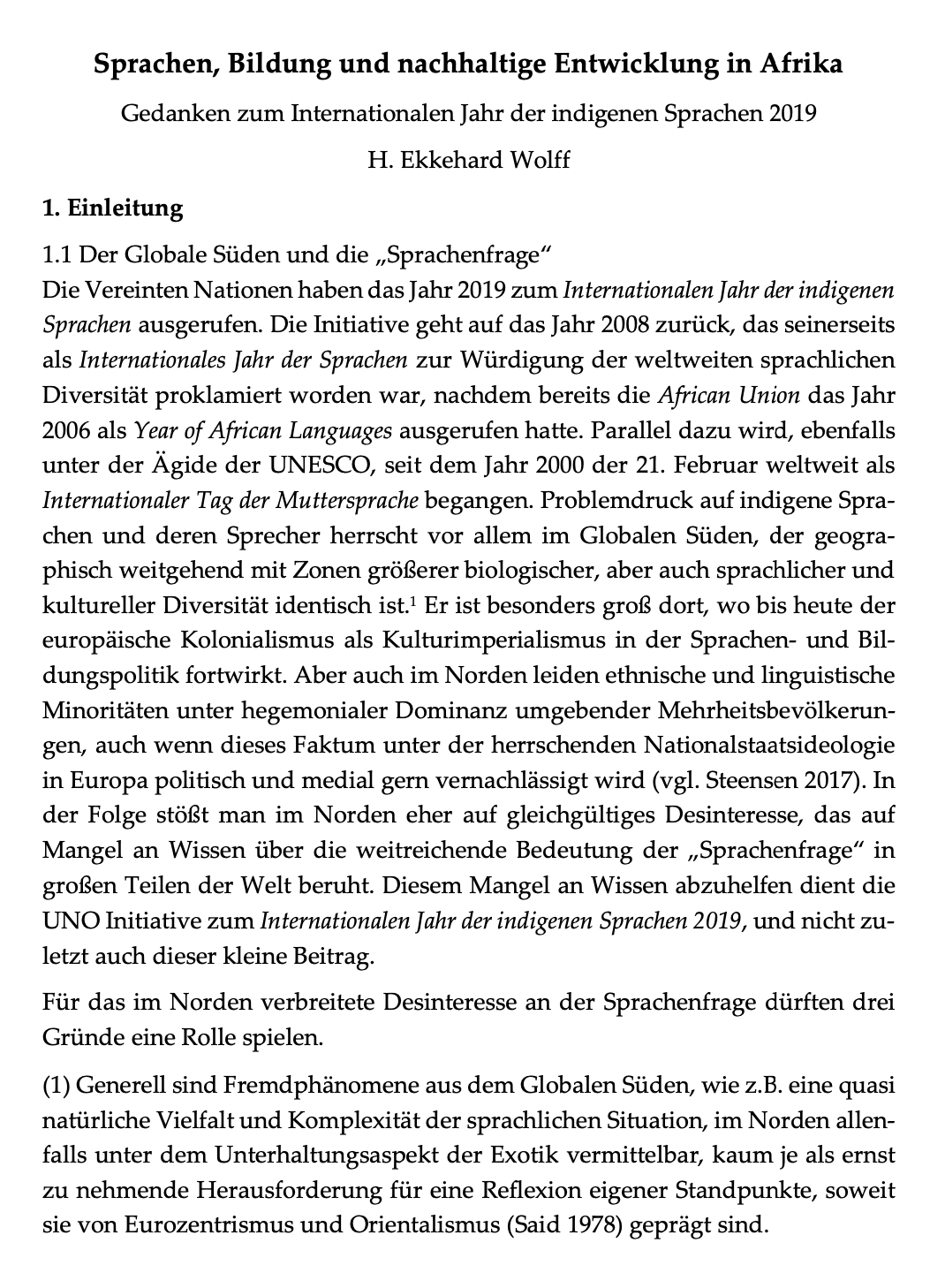Sprachen, Bildung und nachhaltige Entwicklung in Afrika
Gedanken zum Internationalen Jahr der indigenen Sprachen 2019
DOI:
https://doi.org/10.18716/ojs/the_mouth.3360Abstract
Die Vereinten Nationen haben das Jahr 2019 zum Internationalen Jahr der indigenen Sprachen ausgerufen. Die Initiative geht auf das Jahr 2008 zurück, das seinerseits als Internationales Jahr der Sprachen zur Würdigung der weltweiten sprachlichen Diversität proklamiert worden war, nachdem bereits die African Union das Jahr 2006 als Year of African Languages ausgerufen hatte. Parallel dazu wird, ebenfalls unter der Ägide der UNESCO, seit dem Jahr 2000 der 21. Februar weltweit als Internationaler Tag der Muttersprache begangen. Problemdruck auf indigene Sprachen und deren Sprecher herrscht vor allem im Globalen Süden, der geographisch weitgehend mit Zonen größerer biologischer, aber auch sprachlicher und kultureller Diversität identisch ist. Er ist besonders groß dort, wo bis heute der europäische Kolonialismus als Kulturimperialismus in der Sprachen- und Bildungspolitik fortwirkt. Aber auch im Norden leiden ethnische und linguistische Minoritäten unter hegemonialer Dominanz umgebender Mehrheitsbevölkerungen, auch wenn dieses Faktum unter der herrschenden Nationalstaatsideologie in Europa politisch und medial gern vernachlässigt wird. In der Folge stößt man im Norden eher auf gleichgültiges Desinteresse, das auf Mangel an Wissen über die weitreichende Bedeutung der „Sprachenfrage“ in großen Teilen der Welt beruht. Diesem Mangel an Wissen abzuhelfen dient die UNO Initiative zum Internationalen Jahr der indigenen Sprachen 2019, und nicht zuletzt auch dieser kleine Beitrag.

Downloads
Published
Issue
Section
License

This work is licensed under a Creative Commons Attribution 4.0 International License.
CC BY 4.0 deed
https://creativecommons.org/licenses/by/4.0/deed.en
You are free to:
- Share — copy and redistribute the material in any medium or format for any purpose, even commercially.
- Adapt — remix, transform, and build upon the material for any purpose, even commercially.
- The licensor cannot revoke these freedoms as long as you follow the license terms.
Under the following terms:
- Attribution — You must give appropriate credit , provide a link to the license, and indicate if changes were made . You may do so in any reasonable manner, but not in any way that suggests the licensor endorses you or your use.
- No additional restrictions — You may not apply legal terms or technological measures that legally restrict others from doing anything the license permits.
Notices:
You do not have to comply with the license for elements of the material in the public domain or where your use is permitted by an applicable exception or limitation .
No warranties are given. The license may not give you all of the permissions necessary for your intended use. For example, other rights such as publicity, privacy, or moral rights may limit how you use the material.Notice
This deed highlights only some of the key features and terms of the actual license. It is not a license and has no legal value. You should carefully review all of the terms and conditions of the actual license before using the licensed material.
Creative Commons is not a law firm and does not provide legal services. Distributing, displaying, or linking to this deed or the license that it summarizes does not create a lawyer-client or any other relationship.
Creative Commons is the nonprofit behind the open licenses and other legal tools that allow creators to share their work. Our legal tools are free to use.





